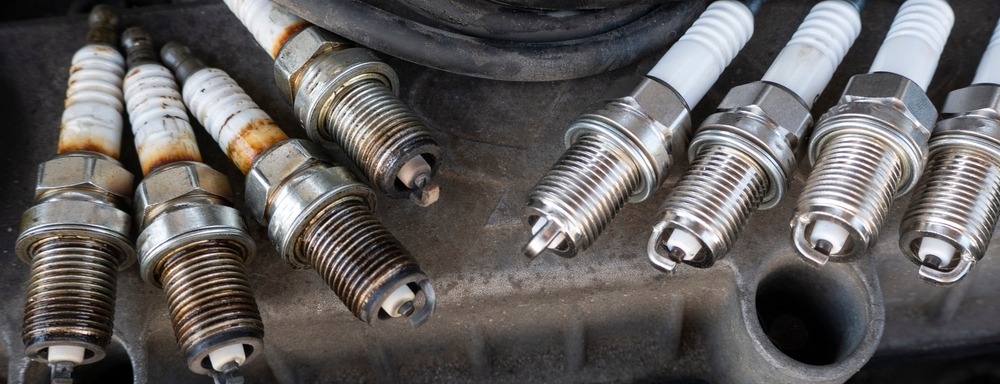
10 Oct Spark Plugs Replacement: Avoid Common Mistakes
 If you have the knowledge and inclination, you can perform your own vehicle’s spark plugs replacement. It’s also acceptable to schedule a spark plugs service with professionals. Whichever choice you make, always follow the recommended replacement intervals set by the manufacturer. If you choose to replace your car’s spark plugs yourself, read these basic steps to understand spark plugs, replacement intervals, and common mistakes that cause engine misfires.
If you have the knowledge and inclination, you can perform your own vehicle’s spark plugs replacement. It’s also acceptable to schedule a spark plugs service with professionals. Whichever choice you make, always follow the recommended replacement intervals set by the manufacturer. If you choose to replace your car’s spark plugs yourself, read these basic steps to understand spark plugs, replacement intervals, and common mistakes that cause engine misfires.
Use Correct Spark Plugs
Every car manufacturer specifies the brand, size, and type of spark plugs in each vehicle’s engine. Be sure to consult your owner’s manual or talk to your auto technician about the correct spark plugs for your automobile.
WHY: Incorrect plugs can create malfunctions like hard starting, rough idling, and engine misfires. They can also create premature wear of the plug and the surrounding components. Lastly, improperly sized threads can strip out or damage the compressible sealing ring, causing a lack of gas tightness.
Work On A Cool Engine
Your vehicle’s engine should be cool before you start replacing the spark plugs.
WHY: The engine space is small, so hot components can easily burn your hands. Also, the plug threads can be damaged if installed into a hot cylinder head.
Clean Work Space
Use a vacuum cleaner to remove dirt and debris around the plugs. Prevent all particulates from entering the combustion chambers while replacing the old plugs.
WHY: Foreign matter in the combustion chambers can cause damage to the engine and plugs.
Use The Correct Tools
Invest in the proper tools for the job. An appropriately sized spark plug puller and specialized plug socket (with a rubber interior) will protect the plugs from damage during the installation.
WHY: Using a regular socket can easily cause unintended damage to the plugs. A dropped plug can have fine cracks, chips, or bent electrodes that will cause malfunctions.
Hand Tighten Before Torque
When installing new spark plugs, seat them carefully and avoid cross-threading. Once snug, use a torque wrench to tighten them as your owner’s manual suggests.
WHY: Improperly tightened plugs (too tight or too loose) can cause damage and corrosion to the interior of the cylinder head due to a lack of gas tightness.
Replace All The Spark Plugs
Always replace the whole plug set in one service, but remove and replace them individually. It’s easier to keep track of the wires when replacing them in sequence. Exchanging all the old plugs, even if only one or two are faulty, ensures balanced engine performance.
WHY: Old plugs that are not replaced can fail soon after replacing only a few and may cause engine misfires.
Install New Spark Plugs
Auto manufacturers recommend only using new replacement spark plugs.
WHY: Used, ‘cleaned’ or damaged plugs often fail. They may cause misfires and can increase engine wear or even failure.
Research Coatings & Grease
The use of anti-seize coating on spark plug threads is somewhat controversial. Always follow the manufacturer’s guidelines for the type of plug you use. Additionally, using dielectric grease at the end of the plug wires is brand-specific, so follow the instructions for your plug type.
WHY: Too much dielectric grease can interfere with the connection between the nipple and the plug wire connectors. This will significantly reduce current flow, cause plug firing problems, and cause a rough idle engine.
Anti-seize thread coatings may also cause incorrect torque readings on plugs designed to be used without them (like Bosch).
Spark Plugs Replacement Intervals
Spark plugs replacement intervals vary by the vehicle’s age, make, and model. Additionally, factors such as the type of plugs, driving conditions, and custom upgrades can adjust the mileage markers. Generally, standard copper-tipped plugs require replacement every 30,000 to 50,000 miles. Platinum or iridium-tipped plugs can last up to 100,000 miles. However, it’s wise to consult your vehicle’s manual for the manufacturer’s specific recommendations.
Auto Maintenance in Jacksonville
JJ’s Auto Care is a family-owned and operated company specializing in general auto repair and factory-scheduled maintenance, including spark plugs service. Our qualified auto repair technicians listen to your concerns and provide the best solution for your needs.
Schedule Spark Plugs Service
If your car is experiencing rough idling, or engine misfires call JJ’s Auto Care at (904) 721-6646 or visit us online to schedule a tune-up or spark plugs service.

